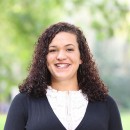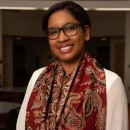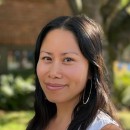Research Office News
Pages
 Daphne Watkins’ New Book Focuses on Secondary Data in Mixed Methods Research
Daphne Watkins’ New Book Focuses on Secondary Data in Mixed Methods ResearchProfessor Daphne Watkins’ new book, “Secondary Data in Mixed Methods Research,” has been released as part of Sage Publishing’s Mixed Methods Research Series. It is the first book to focus on the use of secondary, or existing, data in mixed methods research, and explains how to find and evaluate sources of secondary data through research design, and writing and reporting. "Writing this book was both hard work and heart work. Few scholars of color serve as thought leaders in mixed methods research, but now is the time for us to adapt traditional research approaches so that they help us serve our communities and our needs,” says Watkins. “I hope my contribution to the field will not only help scholars complete their mixed methods projects with secondary data but also inspire them to identify the gaps in our field and fill them."
- July 19, 2022
- Learn more »


 Analidis Ochoa, Luke Shaefer and Andrew Grogan-Kaylor Blood Plasma Study Cited in Washington Post
Analidis Ochoa, Luke Shaefer and Andrew Grogan-Kaylor Blood Plasma Study Cited in Washington PostAnalidis Ochoa, Luke Shaefer and Andrew Grogan-Kaylor’s 2021 study on blood plasma donations and poverty was cited in the recent Washington Post article "Surviving Inflation One Plasma Donation at a Time."
- July 19, 2022
- Learn more »
 Matthew Smith’s Research on Virtual Job Training Programs Cited in Chicago Tribune
Matthew Smith’s Research on Virtual Job Training Programs Cited in Chicago TribuneAssociate Professor Matthew Smith’s research is cited in a Chicago Tribune story exploring the ways to support people with autism to enter the workforce. “Virtual job training programs such as one at the University of Michigan can help fill in these gaps in training. A computerized program developed for virtual job training provided 15 practice job interview sessions of increasing difficulty. This program resulted in greater success in obtaining a job within six months, improved job interview skills and reduced anxiety about interviewing.”
- July 14, 2022
- Learn more »
 Terri Friedline Submits Comments About Overdraft Fees to U.S. House Committee on Financial Services
Terri Friedline Submits Comments About Overdraft Fees to U.S. House Committee on Financial ServicesAssociate Professor Terri Friedline submitted written comments about the elimination of overdraft fees to the U.S. House Committee on Financial Services March 31, 2022 hearing. “If private banks remain unable or unwilling to take the steps necessary for creating equal, dignified access to retail financial services, then they should step aside and enthusiastically support options such as postal banking, public banking, mission-driven Community Development Financial Institutions, and mutual aid or solidarity economy networks, which are dedicated to serving people in need without charging expensive fees and adding to burdensome debt,” she writes.
- July 14, 2022
- Learn more »
 Brian Perron Fights Academic Fraud
Brian Perron Fights Academic FraudProfessor Brian Perron has been invited to speak with members of the U.S. House of Representatives Science Committee regarding his investigation of a Russian academic paper mill. Such entities provide fraudulent services – ghostwriting, brokering authorship on accepted papers, and falsifying data–to researchers seeking to publish articles in peer-reviewed journals. Perron has identified approximately 200 papers in the published literature that have evidence of being brokered through this paper mill. His investigation led to the retraction of 30 published articles from the International Journal of Emerging Technologies in Learning, representing the largest number of retractions from a single social science journal.
“I have seen the nature of scientific publishing change so much, “Perron says. “It used to be, you identified the right journals and you knew you were competing with the best work.” Then Perron saw a blog post about people selling scholarly articles. “You find these articles in the published literature,” he says. “Some are brokered through open access journals, and there's the pay-to-publish model; with a few thousand dollars, you get any paper published you want.
“We should have stronger restrictions if somebody's getting federal funding,” he says. “There is a push to make research more widely available, and open access journals were going to solve that. We want government funded science to be more accessible, but we want to weed out the profiteers.”
“It’s exciting that lawmakers are interested in this topic,” Perron says. “You might call what I’m doing ‘citizen science.’ What I dig up is not peer reviewed. It is more like investigative journalism, like doing citizenship and science together.”
- July 13, 2022

 Two PhD Students Receive 2022 Next Generation Initiative Awards
Two PhD Students Receive 2022 Next Generation Initiative AwardsTwo Michigan Social Work PhD students have received 2022 Next Generation Initiative Awards from the Institute of Social Research. Analidis Ochoa was awarded a Marshall Weinberg Endowment for her project “Blood Veins for Hire: Plasma Donation in an age of Inequality, Instability, and Precarious Work.” Briana Starks received a Sarri Family Fellowship for Research on Educational Attainment of Children in Low Income Families for her project “Diapers, Debt, & Degrees: The Practical and Theoretical Implications of Maternal Postnatal Educational Attainment.”
- July 7, 2022
- Learn more »
 Matthew Bakko Explains Bail Funds in The Conversation
Matthew Bakko Explains Bail Funds in The ConversationPhD student Matthew Bakko explains in The Conversation the history of bail funds and why they matter. “More than 80% of the over 650,000 people in jail in the U.S. have not been convicted and are presumed innocent but can’t afford bail,” he writes. “Helping people pay bail is important because it means that they can return home and remain employed or in school. They are also less likely to be pressured to accept a plea deal, in which they plead guilty to a lesser charge to serve less time, whether they committed the alleged offense or not.”
- July 6, 2022
- Learn more »
 Jaclynn Hawkins Named Member of Institute for Implementation Science Scholars 2022-24 Cohort
Jaclynn Hawkins Named Member of Institute for Implementation Science Scholars 2022-24 CohortJaclynn Hawkins has been named a member of the Institute for Implementation Science Scholars 2022-24 cohort. The two-year mentored training program is for investigators interested in applying dissemination and implementation methods and strategies to reduce the burden of chronic disease and address health inequities.
- July 5, 2022
- Learn more »
 Valerie Taing Awarded 2022-2023 Rackham Predoctoral Fellowship
Valerie Taing Awarded 2022-2023 Rackham Predoctoral FellowshipPhD student Valerie Taing has been awarded a 2022-2023 Rackham Predoctoral Fellowship. The Rackham Predoctoral Fellowship is one of the most prestigious awards granted by the Rackham Graduate School. Doctoral candidates who expect to graduate within six years after beginning their degrees are eligible to apply, and the strength and quality of their dissertation abstract, publications and presentations, and recommendations are all taken into consideration when granting this award.
- July 5, 2022
- Learn more »
 Finn McLafferty Bell Successfully Defends Dissertation
Finn McLafferty Bell Successfully Defends DissertationFinn McLafferty Bell, Joint Doctoral Program in Social Work and Sociology, has successfully defended his dissertation entitled “Marginalized Food Growers in a Changing Environment: Tracing Collective Survival Strategies.” His committee consisted of Sandra Danziger and Katie Richards-Schuster. Bell has accepted a tenure-track assistant professor of Human Services at the University of Michigan-Dearborn.
- June 21, 2022